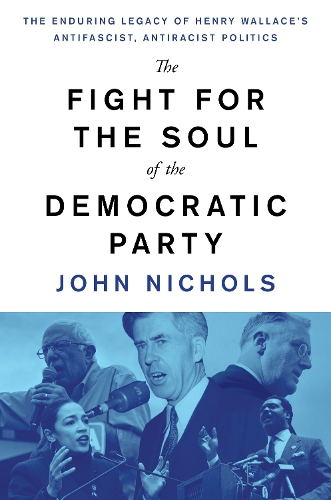
The Fight for the Soul of the Democratic Party: The Enduring Legacy of Henry Wallace's Anti-Fascist, Anti-Racist Politics
(Hardback)
Publishing Details
The Fight for the Soul of the Democratic Party: The Enduring Legacy of Henry Wallace's Anti-Fascist, Anti-Racist Politics
By (Author) John Nichols
Verso Books
Verso Books
2nd July 2020
United Kingdom
Classifications
General
Non Fiction
Political structures / systems: autocracy, totalitarianism and dictatorship
Political science and theory
History of the Americas
Social and cultural history
320.533
Physical Properties
Hardback
304
Width 140mm, Height 210mm, Spine 24mm
394g
Description
Seventy-five years ago, Henry Wallace, then the vice president of the United States, mounted a campaign about the Danger of American Fascism. As fighting in the European and Japanese theatres drew to a close, Wallace warned that the country might win the war and lose the peace; that the fascist threat the United States. was battling abroad had a terrifying domestic variant, growing rapidly in power: wealthy corporatists and their allies in the media. Wallace predicted that if the New Deal project was not renewed and expanded in the postwar era, American fascists would use fear mongering, xenophobia, and racism to regain economic and political power. He championed a progressive postwar worldan alternative to the rising triumphalist American Century notion in which the United States rejected colonialism and imperialism. Wallaces political visionas well as his nomination to remain vice presidentwas sidelined by Democratic big city bosses and southern segregationists. In the decades to come, other progressives would mount similar campaigns: George McGovern and Jesse Jackson most prominently. As John Nichols chronicles in this book, they ultimately faileda warning to would-be reformers todaybut their efforts provide us with insights into the nature of the Democratic Party and strategic lessons for the likes of Bernie Sanders and Alexandria Ocasio-Cortez.
Reviews
"Every progressive must read this book. John Nichols reminds us that Henry Wallace was the true heir to Roosevelt's New Deal. He stood up against militarism, championed health care as a right, and fought for racial justice. When the party bosses denied Wallace a place on the Democratic Party's 1944 ticket, they chose caution over a bold vision for 'winning the peace' with an Economic Bill of Rights and the Four Freedoms. As Nichols reveals, that set a pattern for compromise that sold the party and the nation short. Now, seventy-five years later, as progressives again fight for the soul of the Democratic Party, Nichols gives us the history and vision for a new progressive era." -REPRESENTATIVE RO KHANNA "Henry Wallace is a political figure--one of the giants of the mid-twentieth century--who has kind of been pushed out of the national political discussion ... Nichols [tells us] that one of the reasons Wallace was not renominated in 1944 was because of his opposition to racism. The segregationists didn't want him around." -SENATOR BERNIE SANDERS "More than a history book--this is an examination of what progressives must do to retake our democracy. Nichols points the way toward how we can build a party based on peace, liberty, and justice for all." -REPRESENTATIVE ILHAN OMAR "Nichols is a remarkable thinker and writer. He recognizes that fights that were not won in the past by advocates of economic and racial justice and peace can now be won--if we are determined enough, and hopeful enough, to carry the struggle forward." -REVEREND JESSE JACKSON "Nichols is so good at exploring the roots of U.S. radical politics, including our long socialist history. He puts the fights we're in now into perspective--and gives us inspiration to carry on." -MARIA SVART, National Director of Democratic Socialists of America "Henry Wallace thought we could avoid the Cold War internationally and work on addressing racism at home. He was ahead of his time, and he was punished for that. Maybe, now, we can recognize he was right about a lot of things." -NOAM CHOMSKY
Author Bio
John Nichols is the Washington correspondent for The Nation magazine, a contributing writer for the Progressive and In These Times, and the associate editor of Madison, Wisconsins Capital Times. He is the author of several books, including The Death and Life of American Journalism, The Genius of Impeachment, and The S Word.
